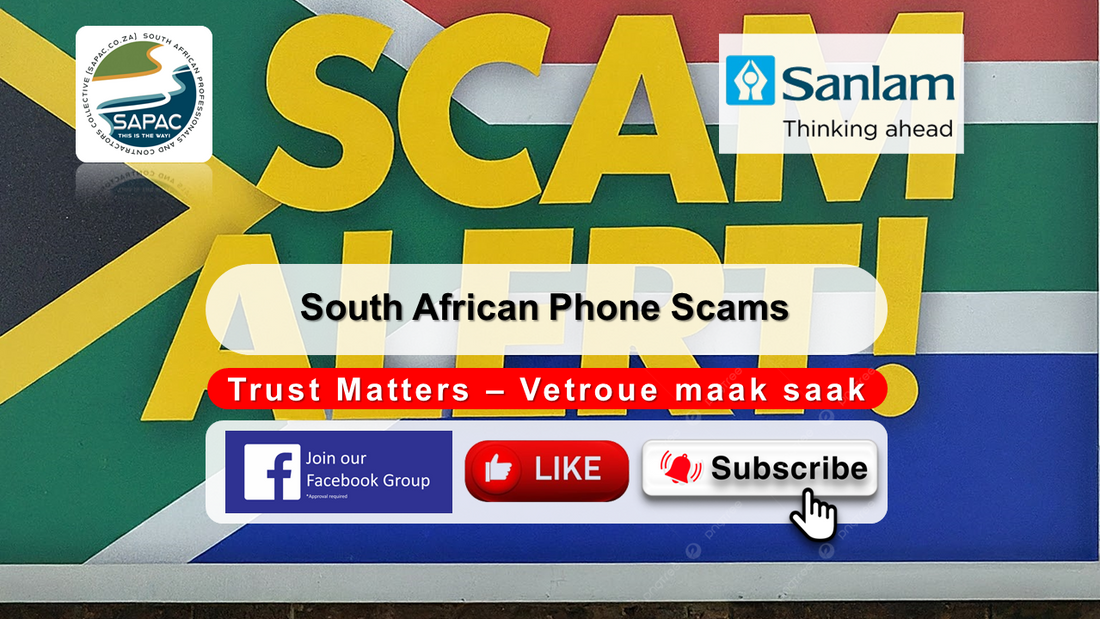
South African Phone Scams
SAPAC ReporterShare
South African Phone Scams
Prepared by : Independent
Article Classification: Ways Scammers reach You
Image courtesy: SAPAC Professionals and Contractors
Get in contact with SAPAC:![]() Besoek | Visit https://sapac.co.za/
Besoek | Visit https://sapac.co.za/
📑 Complete Form: Link (PRESS HERE) FOR SAPAC
[GOEIE INFORMASIE] SLUIT AAN! https://bit.ly/JoinSAPAC
Areas: Southern Africa, Northern Cape, Western Cape, Cape Winelands, Free State, Gauteng, North West Province, Limpopo, Mpumalanga, Natal
South African Phone Scams
Phone scams is annoying - they cost South African millions of rands in losses every year.
1 in 3 reported scams happen by phone. Scammers call, claiming to be from well-known organizations. This includes government organizations, law enforcement, investment, law firms, banks, telecommunication providers, contractor trades people and even other professional service provider.
They make it sound urgent to get to you act quickly. They may try to convince you to give them your personal or bank account details, or remote access to your computer. The caller may already have some details about you, such as your name or address.
Warning signs it might be a scam
Stop and think. It's probably a scam call if the caller:
1. Ask you for personal or financial information:
- payment, or for you to move money between accounts
- your password, pin, one-time pin code, authenticator code or some other security information.
- banking or credit card details to process a refund or over payment
2. Wants you to install software to access your computer, phone or other mobile device.
3. Threatens you with immediate arrest, or blackmail even deportation if you are legally in South Africa
4. Suggest your accounts have been hacked or involved with fraud.
5. Informs you about a way to make quick, easy money with little risk or effort.
You can still receive scam calls even if your number is listed as private!
Check the call is real
- Never use contact details given by a caller or written in an email, SMS or WhatsApp message.
- Call the organization the company or person back on a phone number you have found yourself (on their website).
- Use the organization's secure, authenticated platform portal or app (never through a link).
Be scam aware
- Immediately hang up on anyone who tries to threaten or intimidate you.
- Never give anyone remote access to your computer.
- If an offer appears too good to be true, it probably is.
Think you've been scammed?
1. Act fast to stop any further losses
Contact your bank or card provider immediately to report the scam. Ask them to stop any transactions.
Change passwords on all your devices and online accounts like email, banking, government sites and shopping sites.
2. Report the Scam
Once you have had the opportunity to have secured your details, you should open up a SAPS Case number, you can help us to try and stop the scammers or to warn other by reporting the scam to us. Depending on the nature of the scam site with a case number it can be listed.
3. Get help to recover
With your case number visit your nearest Department of Home Affairs and provide them with the information of your case including your signed affidavit. They should be able to capture the fact that your personal details may have been stolen and may be used for criminal activities. Visit their Website and make an appointment https://www.dha.gov.za/
Common Phone scam types

|
South African Impersonation scamsIdentity theft is on the rise and is a type of fraud that involves using someone else`s identity to gain benefits or to steal money |
|
|
South African Threats and extortion scamsScammers will use any means possible to steal your identity or your money - including threatening your life or "hijacking" your computer. |
South African Professionals and Contractors (SAPAC) Time


